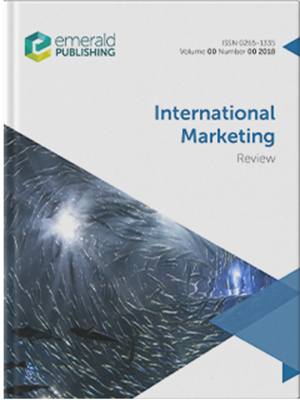信奉基督教的阿拉伯人的商业模式与信奉穆斯林的阿拉伯人的不同吗?
IF 4.6
3区 管理学
Q1 BUSINESS
引用次数: 0
摘要
目的本研究旨在测试一个测量量表来检验围绕阿拉伯基督徒和阿拉伯穆斯林的社会商业网络(Wasta)。设计/方法/方法采用31项量表来捕捉Wasta,该量表由以下三部分组成:Mojamala(情感)、Hamola(思维)和Somah(认知)。共有149名阿拉伯基督徒和304名阿拉伯穆斯林受访者被抽样调查,并使用多组结构方程模型来证实这一概念并检验几个假设。研究结果研究结果表明,为了在阿拉伯环境中取得成功,在Hamola盛行之前,首先发展Mojamala是一个连续的过程。阿拉伯基督徒有融入社会的动机,并通过普遍信任建立关系。与此同时,穆斯林阿拉伯人倾向于保留自己独特的文化,利用社交网络建立特定的信任。伊斯兰教法原则也可能在解释为什么满意度不是阿拉伯穆斯林推动关系表现的必要条件方面发挥重要作用。研究的局限性/意义这项研究表明3.7亿阿拉伯人口可能不是完全团结一致的,应该避免被归类在一起。群体内认同是解释阿拉伯穆斯林和阿拉伯基督徒之间商业模式不同的主要因素。研究结果进一步证明,阿拉伯穆斯林的商业模式是基于部落主义或酋长政治,而阿拉伯基督教的商业模式是基于法律框架和一体化。实际意义:该研究支持了先前关于基于部落主义或酋长政治的穆斯林阿拉伯商业模式的研究(Ali, 1995)。研究结果表明,阿拉伯穆斯林的商业模式侧重于特定的信任,而不是阿拉伯基督教商业模式和大多数西方国家普遍存在的普遍信任。研究表明,Mojamala(情感结构)、Hamola(同理心)和Somah(特殊信任)是构建Wasta的有用结构,它们是阿拉伯穆斯林商业模式的核心要素。Mojamala和Somah都直接影响满意度。Somah和满意度对绩效有直接影响。原创性/价值这些发现为支持制度理论提供了证据。同样,从利益相关者理论的角度来看,不仅从经济角度看公司,而且从建立社会制度的角度看公司,可以更好地理解基于不同文化和信仰的商业模式。因此,该研究可以为学者和从业者提供有用的参考,因为他们正在努力提高满意度并在此背景下利用绩效优势。本文章由计算机程序翻译,如有差异,请以英文原文为准。
Are Christian Arabs' business models different from those of Muslim Arabs?
PurposeThe study aims to test a measurement scale to examine social business networks (Wasta) surrounding Arab Christians and Arab Muslims.Design/methodology/approachA 31-item scale was used to capture Wasta, consisting of the following: Mojamala (emotional), Hamola (conative) and Somah (cognitive) tri-components. A total of 149 Christian Arab and 304 Muslim Arab respondents were sampled and multi-group structural equation modeling was used to confirm the concept and test several hypotheses.FindingsThe findings from the study reveal that in order for success to occur within the Arab context, a sequential process of first developing Mojamala is necessary, before Hamola can prevail. Christian Arabs are motivated to integrate with society and form relationships via generalized trust. Muslim Arabs meanwhile tend to retain their distinct culture, using social networks to forge particularized trust. Shariah principles may also play a significant role in explaining why satisfaction was not found to be a necessary condition for Arab Muslims in driving relationship performance.Research limitations/implicationsThe study suggests that the 370 million Arab population may not be totally cohesive and should be refrained from being grouped together. In-group identification is a major contributor in explaining why business models are different between Arab Muslims and Arab Christians. The findings further support that Muslim Arab business models are based on tribalism or sheikocracy, whilst Christian Arab business models are based on legalistic frameworks and integration.Practical implicationsThe study supports prior research associated with Muslim Arab business models based on tribalism or sheikocracy (Ali, 1995). The findings suggest that Arab Muslim business models focus on particularized trust as opposed to generalized trust that is common in Arab Christian business models and in most western countries. The study demonstrates that Mojamala (the emotional construct), Hamola (empathy) and Somah (particularized trust) are useful constructs for building Wasta and they serve a core element for Arab Muslim business models. Mojamala and Somah both directly affect satisfaction. Somah and satisfaction have a direct influence on performance.Originality/valueThe findings provide evidence to support institutional theory. Also from a stakeholder theory perspective, viewing companies, not only through an economic lens, but also building social institutions, can lead to a better understanding of business models drawing on diverse cultures and faiths. The study may therefore serve as a useful reference for academics and practitioners as they grapple to enhance satisfaction and leverage performance advantages within this context.
求助全文
通过发布文献求助,成功后即可免费获取论文全文。
去求助
来源期刊

International Marketing Review
BUSINESS-
CiteScore
8.70
自引率
12.00%
发文量
55
期刊介绍:
International Marketing Review (IMR) is a journal that has, as its core remit, the goal of publishing research that pushes back the boundaries of international marketing knowledge. IMR does this by publishing novel research ideas, and by publishing papers that add substance to, question the basic assumptions of, reframe, or otherwise shape what we think we know within in the international marketing field. IMR is pluralistic, publishing papers that are conceptual, quantitative-empirical, or qualitative-empirical. At IMR, we aim to be a journal that recognizes great papers and great research ideas, and works hard with authors to nurture those ideas through to publication. We aim to be a journal that is proactive in developing the research agenda in international marketing, by identifying critical research issues, and promoting research within those areas. Finally, IMR is a journal that is comfortable exploring, and that fosters the exploration of, the interfaces and overlaps between international marketing and other business disciplines. Where no interfaces or overlaps exist, IMR will be a journal that is ready to create them. IMR’s definition of international marketing is purposefully broad and includes, although is not restricted to: -International market entry decisions and relationships; -Export marketing and supply chain issues; -International retailing; -International channel management; -Consumer ethnocentrism, country and product image and origin effects; -Cultural considerations in international marketing; -International marketing strategy; -Aspects of international marketing management such as international branding, advertising and new product development.
 求助内容:
求助内容: 应助结果提醒方式:
应助结果提醒方式:


